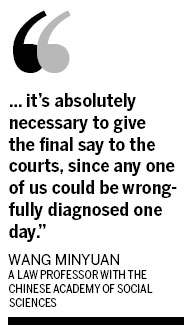Top News
Draft to protect rights of insane
Updated: 2011-08-25 07:51
By Zhao Yinan (China Daily)
BEIJING - Only courts could decide whether a mentally ill person who has committed violent crimes should receive compulsory medical treatment if a draft amendment that was published on Tuesday is adopted.
The draft amendment to the Criminal Procedural Law says prosecutors must obtain an approval from a court before they can arrange medical treatments for defendants who are said to be mentally ill.

The proposed change is meant to protect basic human rights and maintain social stability, said Wang Minyuan, a law professor with the Chinese Academy of Social Sciences.
"The proposed amendment balances the need to protect human rights with the need to crack down on crime. It will prevent criminals from avoiding punishment by pretending to be mentally ill and will protect those who really are ill."
The amendment would also help prevent the police or other authorities from abusing their current power to force people to receive treatment for mental illnesses, said Chen Weidong, a criminal law professor with Renmin University of China.
The public's ire has been raised in recent times by a series of cases in which sane people were forced into treatment in mental hospitals.
In June, Xu Wu, a former firefighter and petitioner who claimed to have been incorrectly diagnosed as having paranoid personality disorder, managed to leave a hospital in Wuhan, a city in Hubei province, where he had stayed for four years.
His release only came after he had twice escaped. The hospital, which was affiliated with the steel company that had employed Xu, said Xu had tried to cause explosions in Beijing in 2006, calling those actions a sign of mental illness.
Xu said his employer simply wanted to punish him for his part in a longstanding dispute over his wages.
After Xu escaped for the second time, going to Guangdong province, his case was widely reported by the media. Xu and his father told reporters that Xu's employer and the Wuhan police had been "persecuting him".
"If the police or an employer can force a person to receive a mental assessment and send him to a mental institution, there is a very good chance that power will be abused," Wang said.
"So it's absolutely necessary to give the final say to the courts."
The draft amendment also stipulates that criminal records would not be kept in the official files of juvenile delinquents who committed minor crimes and later reformed their ways.
The records of repentant juvenile delinquents would be sealed if those delinquents are faced with charges that carry penalties of less than a year and are accused of infringing other people's property or personal rights or of disrupting social order, said Lang Sheng, deputy director of the National People's Congress Standing Committee's Legislative Affairs Commission. Juveniles who meet those conditions would also avoid prosecution.
Lang said the draft amendment would allow courts to seal the criminal records of juvenile defendants who were younger than 18 when they committed their crimes and who were sentenced to less than five years in prison.
Various local governments in China have meanwhile experimented with erasing the criminal records of juvenile delinquents who were convicted of minor infractions. A court in Pengzhou county, Sichuan province, first adopted such a system in May 2007.
E-paper

Blue economy gets a lift
Coastal areas of Shandong, Zhejiang and Guangdong to spearhead sector development.
The light touch
Long way to go
Outdoor success
Specials

Star journalist remembered
Friends, colleagues attended a memorial service to pay tribute to veteran reporter Li Xing in US.

Hot pots
Tea-making treasures catch the fancy of connoisseurs as record prices brew up interest

Hear we go
Polish Audiologist helps thousands of Chinese hear for the first time.
